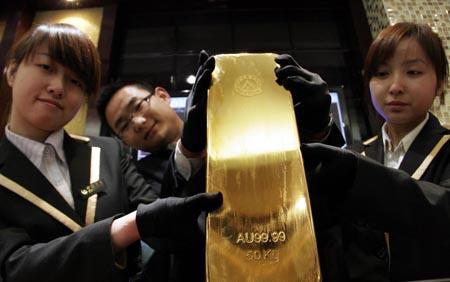
Gold sellers show a 50kg ingot in Nanjing, Jiangsu province. Gold has risen 26 percent this year, set for a 10th annual gain. [Photo / China Daily]
HONG KONG - HSBC Holdings Plc and Standard Chartered Plc, the biggest foreign underwriters of yuan bonds sold in Hong Kong, said sales will double in 2011 as demand outstrips supply and the yuan appreciates.
New issues may increase to a record 80 billion yuan ($12 billion) next year, with as much as 30 billion yuan of sales in the first quarter, according to HSBC, the No 2 underwriter of so-called dim sum bonds. Standard Chartered said sales could top as much as 100 billion yuan as Moscow-based United Co Rusal and BP Plc plan issues. Offerings in 2010 total 40.7 billion yuan, according to data compiled by Bloomberg.
"We're likely to see strong growth to around 80 billion yuan in 2011," said Sean Henderson, HSBC's head of the Asia debt syndicate.
The dim sum market has grown 10-fold since 2008 as China seeks to use the city as an international center to promote the use of the yuan beyond its borders for trade and finance.
Forecasts of currency gains spurred a 29 percent month-on-month jump in yuan deposits in Hong Kong to a high of 279.6 billion yuan in November, according to a statement from the Hong Kong Monetary Authority on Thursday, creating an investor base seeking yuan-denominated securities.
Bond issuers can save about 220 basis points, or 2.2 percentage points, in interest payments by selling yuan bonds in Hong Kong rather than in Shanghai.
Dim sum bonds, named after the Cantonese brunch food, pay an average yield of about 1.6 percent, according to Treasury Markets Association (TMA) data, which tracks 30 outstanding issues including notes sold by China Development Bank Corp and Bank of China Ltd.
The average yield paid on three- to five-year bonds sold by government-linked companies in China is 3.8 percent, according to Bank of America Merrill Lynch's China Quasi-Government Index.
Investment-grade companies in Asia pay an average 4.76 percent to sell dollar-denominated bonds, according to JPMorgan Chase & Co's Asia Credit Index.
China Development Bank's dim sum bonds due November 2013 yield 1.9 percent, according to TMA prices.
The lender's dollar-denominated bonds due in October 2014 yield 2.82 percent, according to BNP Paribas prices, while its yuan bonds due October 2013 pay 3.7 percent. Bank of China, the No 1 underwriter of dim sum bonds this year, said this week it plans to set up an index to track the performance of the most actively traded dim sum notes, according to an e-mailed statement from the bank on Monday.
Issuer pipeline
Haitong Securities Co's Hong Kong unit set up a 5 billion yuan fixed-income fund in September that invests in offshore renminbi bonds.
"The pipeline for issuers is still pretty strong," Kong Weipeng, head of fixed-income investment at Haitong International Asset Management, said in an interview in Hong Kong on Wednesday.
"A stable appreciation would be helpful for the development of the offshore yuan bond market. In the long run, people expect the yuan to appreciate."
The yuan may rise as much as 6 percent next year against the dollar, Zhang Ming, the Beijing-based deputy chief of the International Finance Research Office of the state-backed Chinese Academy of Social Sciences, said this week.
The median forecast of 21 analysts surveyed by Bloomberg is for a 5.9 percent advance to 6.28 yuan against the dollar by the end of next year. China's currency is the best-performing among those of the so-called BRIC (Brazil, Russia, India and China) economies over the past decade.
Bloomberg News





